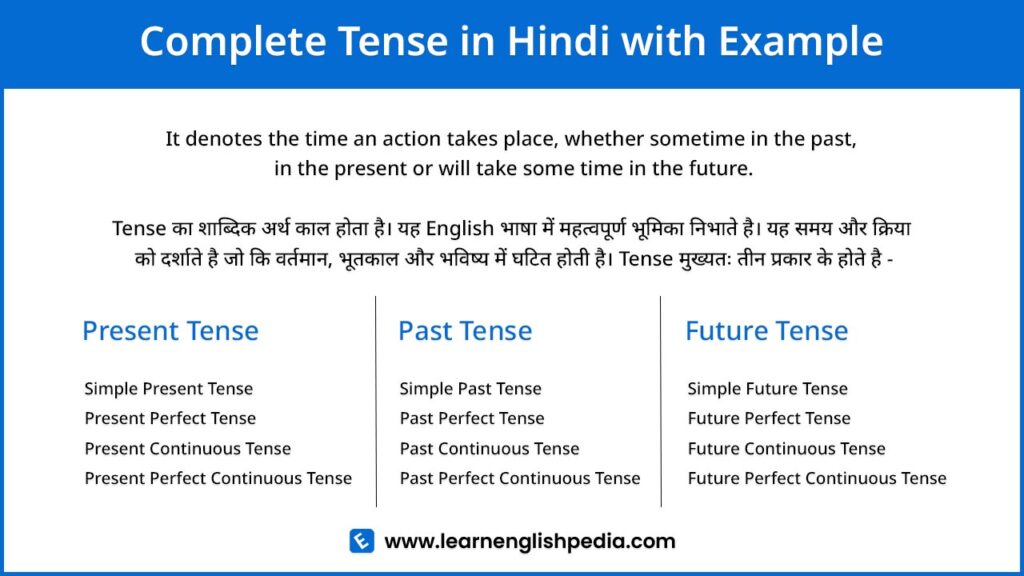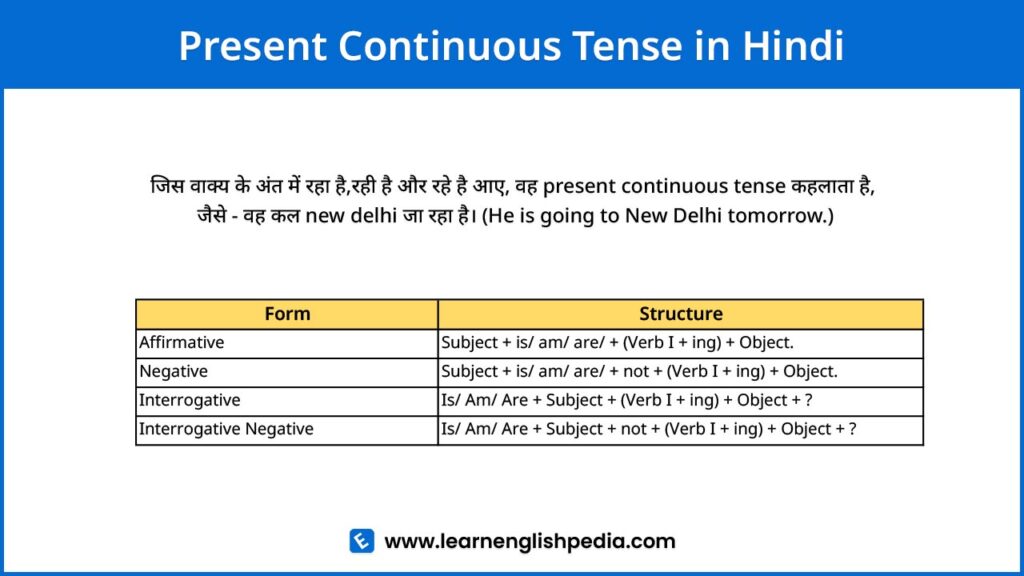इस article में हम Present Indefinite Tense in hindi के बारे में जानेंगे। हम जानेंगे कि present indefinite tense की पहचान क्या है, उसका structure क्या है और उसके उदाहरण क्या क्या है?
Present Indefinite Tense in Hindi
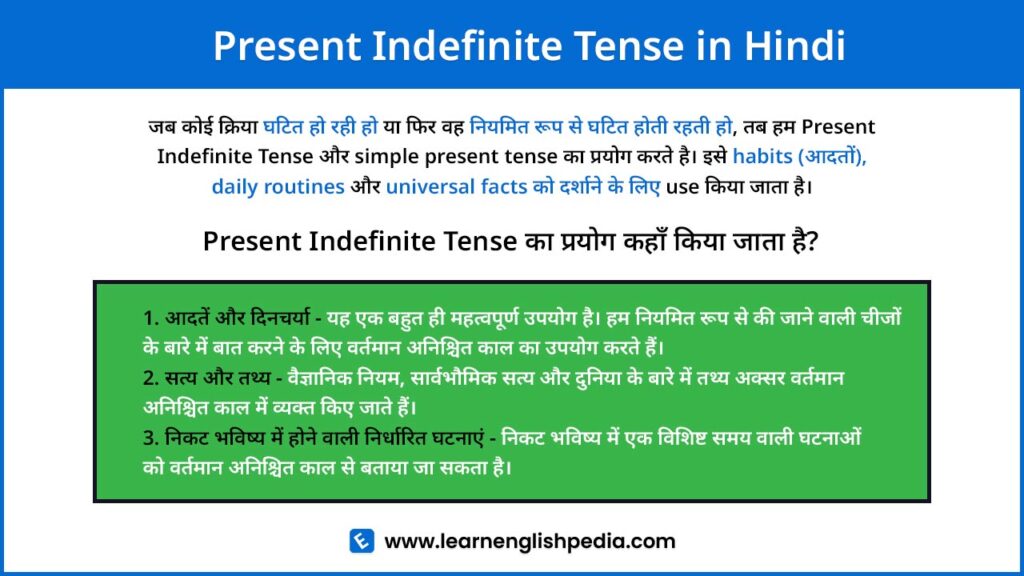
जिस वाक्य के अंत में ता है, ते हैं और ती है आए, उसे present indefinite tense कहते है, जैसे – राहुल स्कूल जाता है। (Rahul goes to School.)
Or
जब कोई क्रिया घटित हो रही हो या फिर वह नियमित रूप से घटित होती रहती हो, तब हम Present Indefinite Tense और simple present tense का प्रयोग करते है। इसे habits (आदतों), daily routines और universal facts को दर्शाने के लिए use किया जाता है।
इस प्रकार के वाक्यों में verb की Ist form का प्रयोग करते है। केवल Third Person Singular (He , She , it , Singular noun ) मे ही verb की First form के साथ s/es का प्रयोग होता है और Plural Subject के साथ Verb की first form का ही use किया जाता है।
Or
वर्तमान अनिश्चित काल (Present Indefinite Tense), जिसे सरल वर्तमान काल (Simple Present Tense) के नाम से भी जाना जाता है, अंग्रेजी व्याकरण में बहुत महत्वपूर्ण है। इसका उपयोग वर्तमान में घट रही विभिन्न घटनाओं या सामान्य रूप से घटने वाली चीजों को व्यक्त करने के लिए किया जाता है। Present Indefinite Tense का प्रयोग कहाँ कहाँ किया जाता है इसके बारे में निचे बताया गया है:
Main Uses of Present Indefinite Tense
Present Indefinite Tense का प्रयोग इन जगहों पर भी किया जाता है:
Habits and Routines
यह एक बहुत ही महत्वपूर्ण उपयोग है। हम नियमित रूप से की जाने वाली चीजों के बारे में बात करने के लिए वर्तमान अनिश्चित काल का उपयोग करते हैं।
Example –
- I drink coffee every morning. – मैं हर सुबह कॉफी पीता हूँ।
- The bus arrives at 7 pm. – बस शाम 7 बजे आती है।
- She brushes her teeth twice a day. – वह दिन में दो बार ब्रश करती है।
General truths and facts
वैज्ञानिक नियम, सार्वभौमिक सत्य और दुनिया के बारे में तथ्य अक्सर वर्तमान अनिश्चित काल में व्यक्त किए जाते हैं।
Example –
- The sun rises in the east. – सूर्य पूर्व दिशा में उगता है।
- Water boils at 100 degrees Celsius. – पानी 100 डिग्री सेल्सियस पर उबलता है।
- Love is patient, love is kind. (from the Bible) – प्रेम सहनशील है, प्रेम दयालु है। (बाइबिल से)
Scheduled events in the near future
निकट भविष्य में एक विशिष्ट समय वाली घटनाओं को वर्तमान अनिश्चित काल से बताया जा सकता है।
Example –
- The train leaves at 7 pm. – ट्रेन शाम 7 बजे छूटती है।
- My flight departs tomorrow morning. – मेरी फ्लाइट कल सुबह रवाना होती है।
- We have a meeting next week. – अगले हफ्ते हमारी एक मीटिंग है।
Note: यह present continuous tense के साथ थोड़ा उलझ सकता है, जिसका उपयोग भविष्य में होने वाले निरंतर कार्यों के लिए किया जाता है।
Sentence Structures
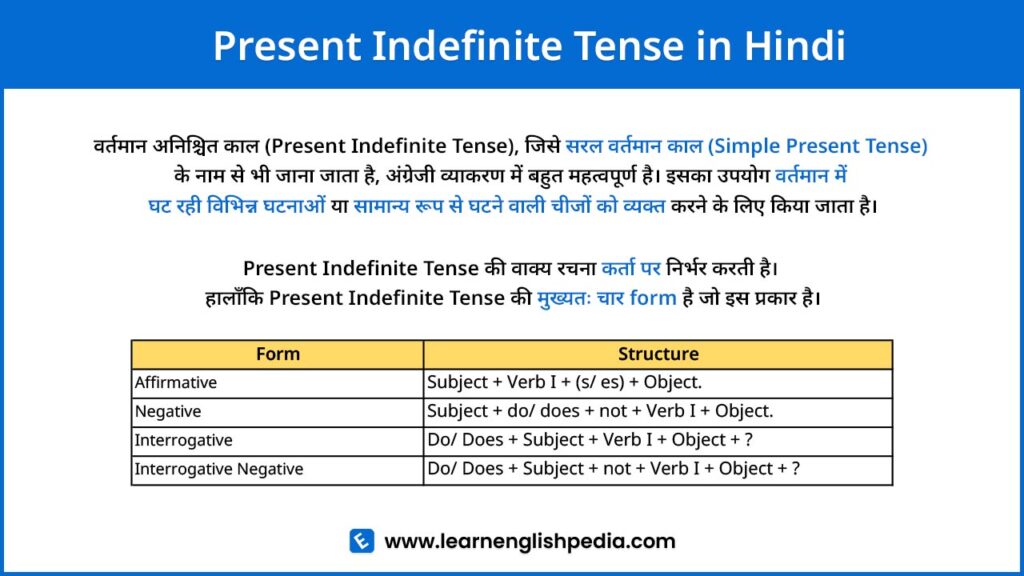
Present Indefinite Tense की वाक्य रचना कर्ता पर निर्भर करती है। हालाँकि Present Indefinite Tense की मुख्यतः चार form है जो इस प्रकार है।
Affirmative Forms (Positive form)
Present indefinite tense के affirmative sentences में verb की 1st form का प्रयोग किया जाता है और third person singular में verb के साथ s या es का प्रयोग किया जाता है।
Structure –
Subject + Verb I + (s/ es) + Object.
Example –
- She goes to school. – वह स्कूल जाती है।
- I go to school. – मै स्कुल जाता हु।
- We go to school. – हम स्कूल जाते हैं।
- You go to school. – तुम स्कूल जाओ।
- They go to school. – वे विद्यालय जाते हैं।
- He goes to school. – वह स्कूल जाता है।
Negative Forms
Present indefinite tense के negative sentences में do not और does not का प्रयोग किया जाता है और third person singular में does not का प्रयोग होता है।
Structure –
Subject + do/ does + not + Verb I + Object.
Example –
Note – I/ you/ we/ they के साथ do not OR don’t का प्रयोग होगा और he/ she/ it के साथ does not OR doesn’t का प्रयोग होगा।
- I do not go to school. – मैं विद्यालय नहीं जाता।
- We do not go to school. – हम स्कूल नहीं जाते हैं।
- You do not go to school. – तुम स्कूल नहीं जाते हो।
- They do not go to school. – वे स्कूल नहीं जाते हैं।
- He does not go to school. – वह स्कूल नहीं जाता है।
- She does not go to school. – वह स्कूल नहीं जाती है।
Interrogative Forms
Present indefinite tense के interrogative sentences में do और does का प्रयोग subject से पहले किया जाता है।
Structure –
Do/ Does + Subject + Verb I + Object + ?
Example –
- Do I go to school? – क्या मैं स्कूल जाता हूँ।
- Do we go to school? – क्या हम स्कूल जाते हैं?
- Do you go to school? – क्या आप स्कूल जाते है?
- Do they go to school? – क्या वे स्कूल जाते हैं?
- Does he go to school? – क्या वह स्कूल जाता है?
- Does she go to school? – क्या वे स्कूल जाती है?
Interrogative Negative Forms
Present indefinite tense के interrogative negative sentences में subject से पहले do और does और subject के बाद not के साथ verb की 1st form का प्रयोग होता है। Interrogative negative forms में हम do not और does not का इस्तेमाल subject से पहले किया जाता है, इस तरह इसके दो structure बनते है।
Structure –
Do/ Does + Subject + not + Verb I + Object + ?
Or
Don’t/ Doesn’t + Subject + Verb I + Object + ?
Example –
- Do I not go to school? – क्या मैं स्कूल नहीं जाता?
- Do we not go to school? – क्या हम स्कूल नहीं जाते?
- Do you not go to school? – क्या तुम स्कूल नहीं जाते?
- Do they not go to school? – क्या वे स्कूल नहीं जाते?
- Does he not go to school? – क्या वह स्कूल नहीं जाता है?
- Does she not go to school? – क्या वह स्कूल नहीं जाती है?
Read More: Greetings in Hindi
Note – (1) es का प्रयोग तभी किया जाता है जब verb के आखरी letters s, ss, sh, ch, j, o और z हो, जैसे – go – goes, kiss – kisses, search – searches, fetch – fetches, clash – clashes, quiz – quizzes, pass – passes, wash – washes, catch – catches, do – does, mix -mixes, etc.
(2) अगर verb का आख़िरी letter ‘y’ हो और उससे पहले कोई consonant हो, तो ‘y’ को ‘i’ में बदलकर ‘es’ का प्रयोग किया जाता है, जैसे – cry – cries, fly – flies, try – tries, verify – verifies, hurry – hurries, copy – copies etc.
(3) अगर verb का आख़िरी letter ‘y’ हो और उससे पहले कोई vowel (a, e, i, o और u) हो, तो ‘y’ को ‘i’ में नहीं बदला जायेगा और ‘y’ के आगे ‘s’ का प्रयोग किया जाता है, जैसे – stay – stays, enjoy – enjoys etc.
Present Indefinite Tense Example in Hindi to English
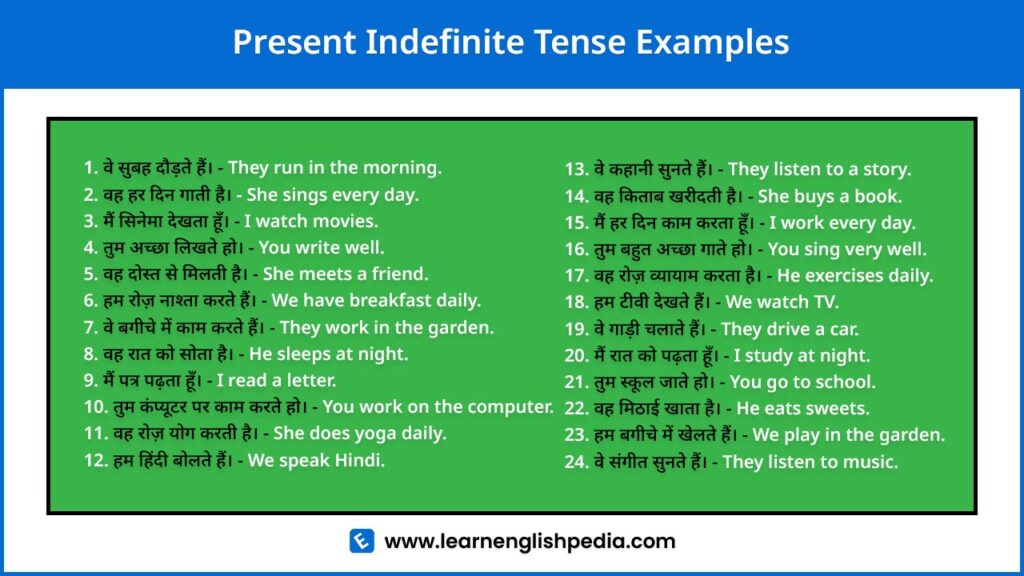
- वे सुबह दौड़ते हैं। – They run in the morning.
- वह हर दिन गाती है। – She sings every day.
- मैं सिनेमा देखता हूँ। – I watch movies.
- तुम अच्छा लिखते हो। – You write well.
- वह दोस्त से मिलती है। – She meets a friend.
- हम रोज़ नाश्ता करते हैं। – We have breakfast daily.
- वे बगीचे में काम करते हैं। – They work in the garden.
- वह रात को सोता है। – He sleeps at night.
- मैं पत्र पढ़ता हूँ। – I read a letter.
- तुम कंप्यूटर पर काम करते हो। – You work on the computer.
- वह रोज़ योग करती है। – She does yoga daily.
- हम हिंदी बोलते हैं। – We speak Hindi.
- वे कहानी सुनते हैं। – They listen to a story.
- वह किताब खरीदती है। – She buys a book.
- मैं हर दिन काम करता हूँ। – I work every day.
- तुम बहुत अच्छा गाते हो। – You sing very well.
- वह रोज़ व्यायाम करता है। – He exercises daily.
- हम टीवी देखते हैं। – We watch TV.
- वे गाड़ी चलाते हैं। – They drive a car.
- वह बाजार से सामान लाती है। – She brings groceries from the market.
- मैं रात को पढ़ता हूँ। – I study at night.
- तुम स्कूल जाते हो। – You go to school.
- वह मिठाई खाता है। – He eats sweets.
- हम बगीचे में खेलते हैं। – We play in the garden.
- वे संगीत सुनते हैं। – They listen to music.
- वह रोज़ नाचती है। – She dances every day.
- मैं रोज़ स्कूल जाता हूँ। – I go to school every day.
- वह किताब पढ़ती है। – She reads a book.
- हम खेलते हैं। – We play.
- वे खाना खाते हैं। – They eat food.
- तुम संगीत सुनते हो। – You listen to music.
- वह सुबह जल्दी उठता है। – He wakes up early in the morning.
- हम हर दिन योग करते हैं। – We do yoga every day.
- वे समय पर आते हैं। – They come on time.
- मैं चाय पीता हूँ। – I drink tea.
- वह हिंदी बोलती है। – She speaks Hindi.
- तुम दौड़ते हो। – You run.
- हम सिनेमा देखते हैं। – We watch movies.
- वे रात को पढ़ते हैं। – They study at night.
- वह अच्छी तरह गाती है। – She sings well.
- मैं पानी पीता हूँ। – I drink water.
- हम मिठाई खाते हैं। – We eat sweets.
- वह घर की सफाई करता है। – He cleans the house.
- तुम गाना गाते हो। – You sing a song.
- वे फुटबॉल खेलते हैं। – They play football.
- वह रोज़ नहाता है। – He takes a bath daily.
- हम पार्टी में जाते हैं। – We go to the party.
- मैं अखबार पढ़ता हूँ। – I read the newspaper.
- तुम सुबह जल्दी उठते हो। – You wake up early in the morning.
- वह हर दिन व्यायाम करती है। – She exercises every day.
- वे घर में पढ़ते हैं। – They study at home.
- हम समय पर काम करते हैं। – We work on time.
- वह संगीत सुनता है। – He listens to music.
- मैं कॉफी पीता हूँ। – I drink coffee.
- तुम किताब लिखते हो। – You write a book.
- वह बाजार जाती है। – She goes to the market.
- हम सब्जी खरीदते हैं। – We buy vegetables.
- वे टीवी देखते हैं। – They watch TV.
- वह खाना बनाती है। – She cooks food.
- मैं पत्र लिखता हूँ। – I write a letter.
- तुम गाड़ी चलाते हो। – You drive a car.
- वह स्कूल में पढ़ता है। – He studies in school.
- हम दोस्त से मिलते हैं। – We meet a friend.
- वे क्रिकेट खेलते हैं। – They play cricket.
- वह नाचती है। – She dances.
- मैं रोज़ काम पर जाता हूँ। – I go to work every day.
- तुम दूध पीते हो। – You drink milk.
- वह हर दिन काम करती है। – She works every day.
- हम रात को खाना खाते हैं। – We eat dinner at night.
- वे पत्र लिखते हैं। – They write letters.
- मैं गाना सुनता हूँ। – I listen to songs.
- तुम चाय बनाते हो। – You make tea.
- वह स्कूल बस लेता है। – He takes the school bus.
- हम शाम को टहलते हैं। – We walk in the evening.
- वे रोज़ पढ़ते हैं। – They read daily.
- वह साइकिल चलाता है। – He rides a bicycle.
- मैं दोस्तों से बात करता हूँ। – I talk to friends.
- तुम फल खाते हो। – You eat fruits.
- वह बहुत मेहनत करती है। – She works very hard.
- हम खेल में जीतते हैं। – We win in the game.
Present Indefinite Tense in Hindi Exercise
Exercise 1: दिए गए शब्दों से वाक्य बनाइए।
- (खाना, मैं, बनाता)
- (वह, गाना, गाता)
- (हम, पुस्तक, पढ़ते)
- (तुम, सुबह, उठते)
- (वे, पानी, पीते)
Exercise 2: वाक्यों को प्रश्नवाचक बनाइए।
- वह स्कूल जाती है।
- हम टीवी देखते हैं।
- तुम साइकिल चलाते हो।
- वे खेलते हैं।
- मैं गाना गाता हूँ।
Exercise 3: वाक्यों को नकारात्मक बनाइए।
- मैं चाय पीता हूँ।
- वह नाचती है।
- हम किताब पढ़ते हैं।
- तुम दौड़ते हो।
- वे गाते हैं।
Exercise 4: दिए गए वाक्यों को वर्तमान काल में बदलिए।
- मैं दौड़ रहा हूँ। (Present Continuous Tense)
- वह सो रही है। (Present Continuous Tense)
- हम पढ़ रहे हैं। (Present Continuous Tense)
- तुम खेल रहे हो। (Present Continuous Tense)
- वे लिख रहे हैं। (Present Continuous Tense)
Exercise 5: अपनी दिनचर्या का वर्णन करें। (Describe your daily routine in Simple Present Tense)
- मैं सुबह 6 बजे उठता हूँ।
- मैं ब्रश करता हूँ और नाश्ता करता हूँ।
- मैं स्कूल जाता हूँ।
- मैं दोपहर को घर वापस आता हूँ।
- मैं शाम को खेलता हूँ।
- रात को मैं खाना खाता हूँ।
- मैं किताब पढ़ता हूँ और फिर सो जाता हूँ।
Exercise 6: दूसरों की दिनचर्या का वर्णन करें। (Describe others’ daily routine in Simple Present Tense)
- मेरी माँ सुबह 5 बजे उठती हैं।
- वह नाश्ता बनाती हैं।
- मेरे पिताजी ऑफिस जाते हैं।
- मेरा भाई स्कूल जाता है।
- मेरी बहन पढ़ाई करती है।
इन सभी अभ्यासों को करने से आपको वर्तमान काल में वाक्य बनाने और समझने में मदद मिलेगी। यह अभ्यास आपको दैनिक जीवन की क्रियाओं को हिंदी में सही ढंग से व्यक्त करने में सक्षम बनाएगा। वर्तमान काल का सही प्रयोग हिंदी भाषा की समझ और उपयोगिता को बढ़ाता है, जिससे आप अधिक प्रभावी तरीके से बातचीत कर सकते हैं।

